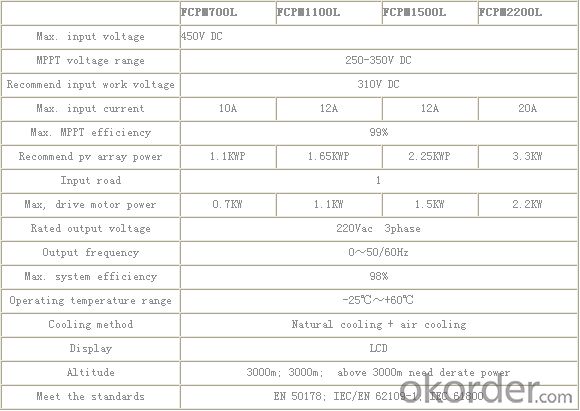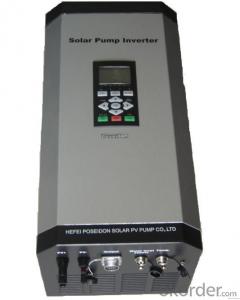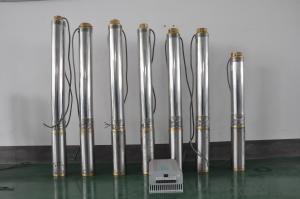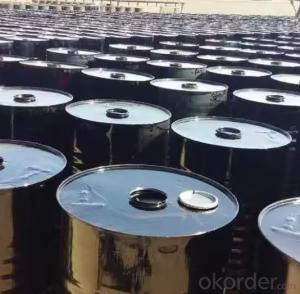Solar pump inverter FCPM1500L
- Loading Port:
- China Main Port
- Payment Terms:
- TT OR LC
- Min Order Qty:
- -
- Supply Capability:
- -
OKorder Service Pledge
Quality Product, Order Online Tracking, Timely Delivery
OKorder Financial Service
Credit Rating, Credit Services, Credit Purchasing
You Might Also Like
Solar pump inverter FCPM1500L Product Description:
Solar water pumping system is constructed with solar panel array,solar pump inverter and AC water pump, DC current produced from solar panel will be delivered to solar pump inverter,and it will convert it into AC current to drive water pump,and will automatically regulate output frequency according to sun radiance intensity,maximally realize MPPT tracking function.
Features
Adopting the proposed dynamic VI maximum power point tracking (MPPT) control method, with fast response, and reliable operation, achieves efficiency of 99%.
Designed with variable frequency driver, greatly improves efficiency
Extremely high efficiency
Digital mode control, with automatic operation and manual operation mode options
Complete protection functions
Adopts intelligent IPM module, with high reliability
LCD display and operation panel, in real time presents operating data
Optional for water level measurement and control circuit
Applicable for general ACC pumps, like centrifugal pump, piston pump etc.
Independent intellectual property; Highly effective, the redundant reliability, exempts the maintenance and the long life.
The pumps are soft started, fully protected.
No batteries are used. So better Sunlight, more water.
Datasheet.

- Q:Can a solar pump be used for water circulation in a swimming pool?
- Yes, a solar pump can be used for water circulation in a swimming pool. Solar pumps are designed to use the energy from the sun to power the pump and circulate water. They are a cost-effective and environmentally friendly option for pool owners as they do not require electricity from the grid to operate. Solar pumps can effectively circulate water in a swimming pool, ensuring proper filtration and distribution of chemicals throughout the pool. This helps to maintain water clarity and cleanliness while reducing energy costs. Additionally, solar pumps are easy to install and require minimal maintenance, making them a convenient choice for pool owners.
- Q:Can a solar pump be used for water supply in botanical gardens?
- Yes, a solar pump can be used for water supply in botanical gardens. Solar pumps are a sustainable and environmentally friendly option that harnesses solar energy to power the pump, making it ideal for supplying water to plants in botanical gardens without relying on traditional electricity sources.
- Q:Can a solar pump be used for water supply in an off-grid home?
- Yes, a solar pump can be used for water supply in an off-grid home. Solar pumps use sunlight to power their operation, making them an ideal choice for off-grid homes without access to electricity. They are an environmentally friendly and cost-effective solution for pumping water from a well or other water sources, providing a reliable water supply for everyday needs.
- Q:Can a solar pump be used for hydroponics?
- Yes, a solar pump can be used for hydroponics. Solar pumps are commonly used in hydroponic systems to circulate nutrient-rich water to the plants. They are an eco-friendly and cost-effective solution, as they utilize solar energy to power the pump, reducing the reliance on electricity and minimizing operational costs.
- Q:Can a solar pump be used in areas with high evaporation rates?
- Yes, a solar pump can be used in areas with high evaporation rates. Solar pumps are designed to utilize solar energy to power water pumping systems, and their efficiency is not affected by high evaporation rates. However, it is important to consider the water availability and replenishment in such areas to ensure the sustainable operation of the solar pump system.
- Q:How does the size of the solar pump system affect the performance and cost?
- The performance and cost of a solar pump system are directly influenced by its size. The size of the system determines its ability to deliver water. A larger system with higher wattage or power output will have a greater pumping capacity, enabling it to move larger volumes of water at a faster rate. This is especially important for agricultural or irrigation purposes that require a significant amount of water. Conversely, a smaller system with lower power output will have limited pumping capacity and may only be suitable for smaller-scale applications like supplying water for households or small gardens. The cost of a solar pump system is also affected by its size. Generally, larger systems with higher power outputs are more expensive to purchase and install compared to smaller systems. This is because larger systems require more solar panels, a larger pump, and often additional components like batteries or inverters to ensure continuous operation. Additionally, the installation and maintenance costs can also increase with the size of the system. However, it's important to note that although larger systems may have a higher upfront cost, they can often provide long-term cost savings through reduced energy consumption and decreased reliance on grid electricity. When choosing the size of a solar pump system, it's vital to consider the specific requirements of the intended application. Factors such as desired pumping capacity, available solar resources, and budget constraints should all be carefully evaluated to determine the optimal size that balances performance and cost effectively. Seeking guidance from a solar pump system expert or installer can also provide valuable insight in selecting the appropriate system size for a specific project.
- Q:Can a solar pump be used in remote areas without access to electricity?
- Yes, a solar pump can be used in remote areas without access to electricity. Solar pumps are designed to operate using solar energy, which means they can function even in areas where there is no grid power or electricity infrastructure. They are an ideal solution for remote locations, providing a reliable and sustainable source of water without the need for electricity.
- Q:Can a solar pump be used in areas with limited access to water reservoirs?
- Yes, a solar pump can be used in areas with limited access to water reservoirs. Solar pumps are designed to operate using solar energy, which means they do not require a grid connection or fuel source. This makes them ideal for remote areas where traditional pumps may not be feasible due to limited access to electricity or water reservoirs. Solar pumps can utilize alternative water sources such as wells, boreholes, or rivers, providing a sustainable and cost-effective solution for water supply in areas with limited access to water reservoirs.
- Q:Can a solar pump be used for geothermal heating or cooling?
- No, it is not possible to use a solar pump for geothermal heating or cooling. Geothermal heating and cooling systems make use of the Earth's internal heat to provide temperature control for a building. This is accomplished by circulating a liquid through pipes buried underground, which absorbs or releases heat depending on the time of year. Conversely, a solar pump is specifically designed to circulate water or other fluids using energy from the sun. Although both systems rely on renewable energy sources, they have distinct functions and cannot be used interchangeably.
- Q:Are there any limitations on the size of the water source for a solar pump?
- Yes, there are limitations on the size of the water source for a solar pump. The size of the water source should be adequate enough to ensure a continuous and sufficient supply of water to the pump. Additionally, the pump's capacity and efficiency may also affect the suitability of the water source, as larger water sources may require higher capacity pumps to effectively utilize the available water.
1. Manufacturer Overview |
|
|---|---|
| Location | |
| Year Established | |
| Annual Output Value | |
| Main Markets | |
| Company Certifications | |
2. Manufacturer Certificates |
|
|---|---|
| a) Certification Name | |
| Range | |
| Reference | |
| Validity Period | |
3. Manufacturer Capability |
|
|---|---|
| a)Trade Capacity | |
| Nearest Port | |
| Export Percentage | |
| No.of Employees in Trade Department | |
| Language Spoken: | |
| b)Factory Information | |
| Factory Size: | |
| No. of Production Lines | |
| Contract Manufacturing | |
| Product Price Range | |
Send your message to us
Solar pump inverter FCPM1500L
- Loading Port:
- China Main Port
- Payment Terms:
- TT OR LC
- Min Order Qty:
- -
- Supply Capability:
- -
OKorder Service Pledge
Quality Product, Order Online Tracking, Timely Delivery
OKorder Financial Service
Credit Rating, Credit Services, Credit Purchasing
Similar products
New products
Hot products
Hot Searches
Related keywords


























